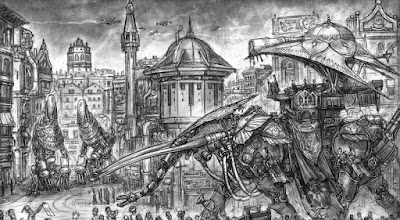So I've been working on my Knave hack for a quick, Pick-up-&-play type of SF system. Mostly just for fun, but also just an expression of how I think about the OSR and my own style of play. Namely: modular, diegetic based, referee plays world and (I know, shocking for an OSR type) dice are fun to roll. Also Ben made Knave to be hacked, and although it has been, not nearly to the extent I expected such a solid, open and modular system like it is should be. So I wanna.
I'm gonna add some pictures from some of the stories by H. Beam Piper available on Project Gutenberg. I love the aesthetic of them so damn much.
 |
| Little Fuzzy |
Mechanics
So it is very much supposed to mimic Knave, and make judicious use of the "use whatever advantage you want" advice in the designer's notes. The base system is rock-solid, and I'm just adding to that. That being said, I gave a whole bunch of mechanics which can be used to emulate certain liked styles of play. Otherwise, the game is just as is.
Character creation is made to be lightning fast. Yet, I have tried to preserve some of the fun mini-game that many modern rpgs have in their character creation system. You roll 3d6 and HP as per normal, but the Inventory slot system is used for abilities as well, called Stamina Slots. The Constitution Defense plus your highest bonus based score slots gives a mechanical backing to what you as a person could weather in your past (allowing you to permanently use slots for abilities), and allows for the other backing of making your character instantly customizable via items. This is unlike other games like html, and other Knave slot hacks, which I find bloats the instant you add extra slots using different ability scores. One might ask why would you mash your history, abilities and items into one set of limited slots, and just how could items then be useful if you have basically no slots if you decide to have a long and storied character? Well, that is the character creation tradeoff - you are modular or you are set. Also, items in SF games usually have a large number of uses. This forces you to immediately consider what you can carry, and whether it is useful. Also good for heist games. This system is simple, forces difficult choices, is play-orientated, and totally able to just be left to dice.
I have yet to be proven disastrously wrong with unintended and unforseen design holes.
 |
| Exploring Ancient Mars in Omnilingual |
Ships
God this is one of those things isn't it. Every SF game needs vehicle mechanics. I have a love/hate relationship with that. So, I have made it that technically you could use whatever system suits your fancy. But I have also been fiddling with a weird system for ships which uses assumed advantage as its mechanic, which was made for the system, but I now realise is so modular as to simply be a type of ship wargame on its own. It has actually made me consider making a caravanserai type SF game, with customizable, simple characters in each ship.
 |
| Those lines, that shuttle! |
Every part is written to facilitate writing on a physical, self-printed out copy of the document. The Mechanics added-on to Knave are simple enough to make more of them, or to remove them entirely. I did this with wide line spacing, wide margins, tables with clear space to add to (with simple enough examples of mechanics) the vague definition of Advantage (which can be used as Knave describes, or, I have suggested sets of mechanics for Dis/Advantaged rolls).
I will add Play Principles for both GM and Player in due time.
Setting
Very SWN-esque, and deliberately. Your player could die at any point. If you are not so sold on character death, you could institute an "at 0 HP you're unconcious, but roll on this effects table." which one can just steal from Into the Odd. To that end, you could use it to play a fun Star Wars game too I guess.
 |
| Frigid, Dead Mars. |
 |
| Archeologists on Mars |
 |
| The Old King |
 |
| you just know they're bastards don't ya |
 |
| Hell yeah space knight. Or MC? |
 |
| space sword! |
 |
| Those dreams of mega-structures... |







